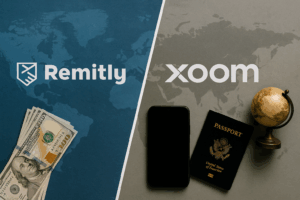When it comes to the Remitly vs Xoom comparison, Remitly stands out for its user-friendly app and flexible delivery speeds, while Xoom offers more integration with PayPal and faster bank deposits in select countries.
Whether you’re sending money to support family, pay overseas bills, or manage investments abroad, choosing the right provider can make a significant difference in cost, convenience, and security.
This article provides a side-by-side comparison of Remitly vs Xoom, answering common questions about each service.
We’ll cover:
- Is xoom better than remitly?
- Is Remitly cheaper than Xoom?
- Can Remitly and Xoom be trusted?
- How can I receive money via Remitly or Xoom?
My contact details are hello@adamfayed.com and WhatsApp +44-7393-450-837 if you have any questions.
The information in this article is for general guidance only. It does not constitute financial, legal, or tax advice, and is not a recommendation or solicitation to invest. Some facts may have changed since the time of writing.

Xoom and Remitly Features Overview
Remitly was founded in 2011 and has quickly grown in popularity among immigrants and expats who need to send money back to family in developing countries.
Its primary advantage lies in its targeted corridors, speed options, and user-friendly mobile app.
Xoom, acquired by PayPal in 2015, leverages PayPal’s global footprint.
It appeals to users already in the PayPal ecosystem and offers more payout options, including bill payments and mobile top-ups, alongside traditional transfers.
| Feature | Remitly | Xoom (by PayPal) |
| Founded | 2011 | 2001 (acquired by PayPal in 2015) |
| Number of countries | Over 170 | Over 160 |
| Transfer options | Bank deposit, cash pickup, mobile money | Bank deposit, cash pickup, door delivery |
| Speed options | Economy & Express | Standard (varies) |
| Integration | Standalone | PayPal-linked |
What’s Better, Remitly or Xoom?

Choosing between Remitly and Xoom largely depends on your transfer priorities whether that’s speed, cost-efficiency, payout flexibility, or geographic coverage.
Both platforms are reputable and widely used, but they cater to slightly different user needs.
Remitly is designed with the remittance market in mind, particularly for users sending money to family or individuals in developing countries.
It offers flexible delivery speeds (including an “Express” and “Economy” option), often with competitive fees and exchange rates.
It’s popular among expats and migrant workers for its simplicity and support in high-volume remittance corridors like India, the Philippines, and Latin America.
Xoom, a PayPal service, is geared toward users who want seamless integration with their PayPal accounts, faster delivery speeds, and a slightly broader range of services beyond personal remittances such as paying international utility bills and phone top-ups.
- Use Cases:
Remitly is ideal for repeat family remittances, especially to cash-pickup locations or mobile wallets. Xoom adds versatility with options to pay bills or reload phones abroad, making it more useful for broader financial interactions. - User Experience:
Remitly’s mobile app and web interface are streamlined and available in multiple languages, with dedicated recipient support. Xoom’s user experience mirrors PayPal’s ecosystem—clean, professional, and highly integrated, but may feel more transactional than relationship-driven. - Global Reach:
Remitly operates in more countries overall as of now, but Xoom also offers wide coverage with strong integration into the PayPal ecosystem. Remitly often provides more localized payout options (e.g., mobile money, door-to-door delivery) in high-demand regions. Depending on where you’re sending money, one may offer significantly better service than the other.
Remitly vs Xoom Rates: Which Offers Better Value?
Both services charge fees and apply exchange rate margins, but the overall value depends on your transfer amount, destination, and delivery speed.
- Transfer Fees:
Remitly generally offers lower upfront transfer fees, especially if you choose the slower “Economy” delivery option. Fees can sometimes be waived for first-time users or larger transfers. Xoom’s fees tend to be higher on average, especially for instant transfers, though it provides transparent fee information before you send. - Exchange Rate Margins:
Both platforms add a margin on top of the mid-market exchange rate, but this can vary significantly by corridor and transfer size. Remitly is often praised for offering more competitive exchange rates in key remittance corridors like the Philippines and Mexico. Xoom, on the other hand, sometimes charges higher margins, especially for less common currency pairs. - Hidden Charges:
Neither service has outright hidden fees, but additional costs can arise if you fund your transfer via credit or debit card instead of bank transfer. Also, receiving banks or payout partners may levy fees on the recipient’s side, which are outside the remit of both Remitly and Xoom.
Situations Where One May Be Cheaper Than the Other
- If you prioritize lower fees and better exchange rates and are willing to wait a little longer, Remitly’s “Economy” service usually provides the best value.
- For fast, near-instant transfers, Xoom’s higher fees might be worth the speed, especially when sending to countries where it has strong local partnerships.
- Large transfers often benefit from Remitly’s tiered pricing and occasional promotions, making it more cost-effective for sending significant sums regularly.
- If you’re sending to a country where Xoom has exclusive payout methods or partnerships, the convenience may justify the slightly higher cost.
In summary, if cost is your main concern and you can plan ahead, Remitly often offers better rates.
For urgent transfers or PayPal integration, Xoom may be preferable despite the higher price.
Is Xoom or Remitly Safe to Use?
Both Xoom and Remitly are widely regarded as trustworthy digital remittance platforms, offering strong protections for users’ funds and data.
However, each approaches compliance, security, and user experience with its own nuances.
Regulatory Compliance and Licensing
- Xoom is licensed and regulated by authorities such as the US Treasury Department’s Financial Crimes Enforcement Network (FinCEN). It adheres to stringent anti-money laundering (AML) and know-your-customer (KYC) rules, requiring users to verify their identity to prevent fraud and criminal activity.
- Remitly is also fully licensed in the countries where it operates and registered with FinCEN in the US. This oversight ensures it complies with legal standards and financial regulations across jurisdictions.
Data Encryption and Fraud Prevention
- Xoom employs advanced encryption and secure socket layer (SSL) protocols to safeguard personal and financial data during transactions. Real-time monitoring helps detect suspicious activity before it becomes a threat.
- Remitly also uses encryption and fraud detection systems that automatically monitor transfers for unusual behavior. If anything suspicious is found, transfers may be paused or canceled as a precaution.
Customer Protection and Support
- Xoom offers buyer protection for delayed or failed transfers due to its own errors. A dedicated support team helps users resolve disputes and request refunds.
- Remitly provides responsive customer support through phone, email, and live chat. It maintains a detailed privacy policy and offers fast resolutions for issues tied to transactions or account access.
Reputation, User Feedback, and Corporate Backing
- Xoom benefits from the credibility of PayPal, its parent company. This connection provides additional peace of mind, as PayPal is known globally for secure online payments. Users can fund transfers directly from PayPal accounts and manage transactions through a familiar interface.
- Remitly has earned strong user ratings on platforms like Trustpilot and the App Store, with many praising its reliability and transparent fee structure. While some negative reviews exist—as with any service—the majority highlight successful transfers and ease of use.
Both Xoom and Remitly have solid credentials when it comes to safety and legitimacy.
Xoom may appeal to users already within the PayPal ecosystem, while Remitly’s strong reputation and responsive service make it equally dependable.
How Do You Receive Money via Remitly or Xoom?
Both Remitly and Xoom offer multiple ways to receive money, making them accessible to a wide range of users across different countries and infrastructure conditions.
The specific options available depend on the recipient’s location and local partnerships.
1. Bank Deposit
- Remitly and Xoom both allow funds to be transferred directly to the recipient’s bank account. This is typically the most secure and convenient method, with funds often arriving within minutes (especially through Xoom) or within 1–3 business days (for Remitly, depending on the chosen speed).
2. Cash Pickup
- For unbanked recipients, both services partner with local agents or financial institutions to offer cash pickup locations.
- Recipients must bring a valid government-issued ID and the transaction reference number to collect funds.
3. Mobile Wallets
- Both platforms support mobile money transfers in select countries.
- Remitly integrates with services like M-Pesa or GCash, while Xoom offers similar functionality in regions where mobile wallets are commonly used.
- This method enables recipients to receive and manage funds instantly via mobile apps.
4. Home Delivery
- In specific regions, Remitly and Xoom provide door-to-door cash delivery services.
- This is a useful option for recipients who are elderly, remote, or unable to travel to a pickup location.
Conclusion
Both Remitly and Xoom offer distinct advantages tailored to different needs, whether it’s prioritizing speed, affordability, or flexible payout options.
Understanding these nuances empowers users to make informed decisions that best suit their unique circumstances, ensuring funds reach their loved ones safely and efficiently.
Ultimately, the best choice depends on the specific priorities and preferences of each indiidual or family, highlighting the importance of comparing features beyond just price or speed.
Pained by financial indecision?

Adam is an internationally recognised author on financial matters with over 830million answer views on Quora, a widely sold book on Amazon, and a contributor on Forbes.



